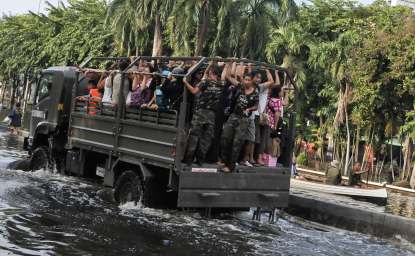Asia's Water Problems Could Provoke Major Conflict
Water scarcity in some areas, floods in others, and various water-related problems could spark major conflicts that have the potential to cripple Asia's economies.
Water scarcity in some areas, floods in others, and various water-related problems could spark major conflicts that have the potential to cripple Asia's economies.
In a 1985 speech, former UN Secretary General Boutros Boutros-Ghali predicted the next major war in the Middle East would be fought over water, not politics. During the past two decades, the quote has been widely repeated in international discourse. Although Boutros-Ghali was proven wrong about the most recent war in the Middle East, the conditions upon which he based his assertion have worsened. Development pressures worldwide and burgeoning populations are straining water resources. With demand at an all-time high, but supply at historic lows, fresh water is at issue in conflicts around the world.
Yet, in some areas, water is one of the few issues warring parties can agree on. Nowhere is this more apparent than in South Asia, which continues to grapple with regional instability and rapid population growth. The subcontinent also contends with widespread water shortages caused by drought, inefficient farming, and urbanization.
As early as the 1950s, South Asia's myriad water problems were perceived as a looming threat to economic development, political stability, and ecological and human health. The dire situation prompted Pakistan and India to agree to allocate specific water rights in the Indus River Treaty (1960), one of the only formal agreements between the usually acrimonious neighbors that remains in force today.
Belying Boutros-Ghali's claim, most water conflicts do not cross international borders but arise between citizens and local industries, or among provinces, counties, and cities. Such domestic water conflicts increasingly are common in China, which is doubly cursed: floods beleaguer southern China while droughts plague its northern regions.
Water scarcity is one of China's greatest problems. Other problems abound, such as the depletion of underground aquifers, the destruction of the fertile soil of China's northern breadbasket, and the emigration of eco-refugees from agricultural areas into already overpopulated, resource-strapped urban centers. Some of the government's solutions to water problems, like major dam projects, have further degraded water quality and displaced more than 1.5 million people. The situation is ripe for water-related conflicts that potentially could cripple the country's rapidly growing economy, making quick resolution ever more important.
Recognizing the challenges of water-related conflicts, the China Environment Forum's Water Working Group brings together U.S. and Chinese experts to share lessons learned, discuss resolution methods, and identify opportunities for cooperation.
Timothy Hildebrandt is a program assistant for the Asia Program and ECSP's China Environment Forum

The Indo-Pacific Program promotes policy debate and intellectual discussions on US interests in the Asia-Pacific as well as political, economic, security, and social issues relating to the world’s most populous and economically dynamic region. Read more



